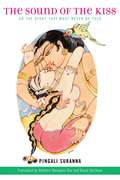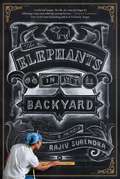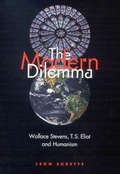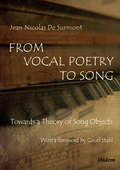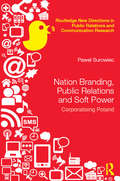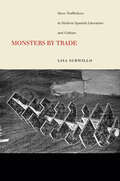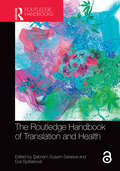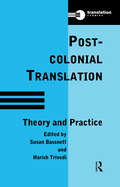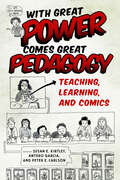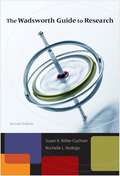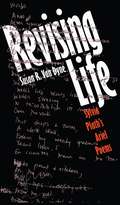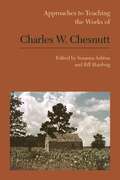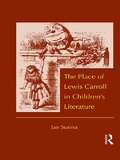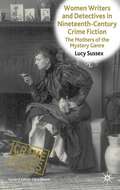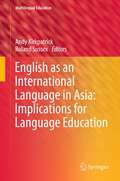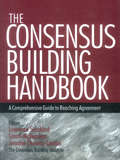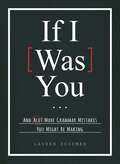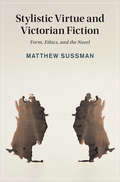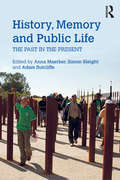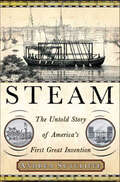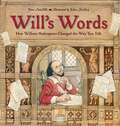- Table View
- List View
The Sound of the Kiss, or The Story That Must Never Be Told (Translations from the Asian Classics)
by Pingali SurannaComposed in the mid-sixteenth century, The Sound of the Kiss, or The Story That Must Never Be Told, could be considered the first novel written in South Asia. Telugu, the language spoken in today's Andhra Pradesh region of southern India, has a classical literary tradition extending over a thousand years. Suranna's masterpiece comes from a period of intense creativity in Telugu, when great poets produced strikingly modern innovations. The novel explodes preconceived ideas about early South Indian literature: for example, that the characters lack interiority, that the language is formulaic, and that Telugu texts are mere translations of earlier Sanskrit works. Employing the poetic style known as campu, which mixes verse and prose, Pingali Suranna's work transcends our notions of traditional narrative. "I wanted to have the structure of a complex narrative no one had ever known," he said of his great novel, "with rich evocations of erotic love, and also descriptions of gods and temples that would be a joy to listen to."The Sound of the Kiss is both a gripping love story and a profound meditation on mind and language. Shulman and Rao include a thorough introduction that provides a broader understanding of, and appreciation for, the complexities and subtleties of this text.
The Elephants in My Backyard: A Memoir
by Rajiv SurendraRajiv Surendra was filming Mean Girls, playing the beloved rapping mathlete Kevin Gnapoor, when a cameraman insisted he read Yann Martel's Life of Pi. So begins his "lovely and human" (Jenny Lawson, author of Furiously Happy) tale of obsessively pursuing a dream, overcoming failure, and finding meaning in life."This was a once-in-a-lifetime chance. I found myself standing dangerously close to the edge of a cliff. Far below me was an incredible abyss with no end in sight. I could turn back and safely return to where I had come from, or I could throw caution to the wind, lift my arms up into the air . . . and jump." --From The Elephants in My Backyard What happens when you spend ten years obsessively pursuing a dream, and then, in the blink of an eye, you learn that you have failed, that the dream will not come true? In 2003, Rajiv Surendra was filming Mean Girls, playing the beloved rapping mathlete Kevin Gnapoor, when a cameraman insisted he read Yann Martel's Life of Pi. Mesmerized by all the similarities between Pi and himself--both are five-foot-five with coffee-colored complexions, both share a South Indian culture, both lived by a zoo--when Rajiv learns that Life of Pi will be made into a major motion picture he is convinced that playing the title role is his destiny. In a great leap of faith Rajiv embarks on a quest to embody the sixteen-year-old Tamil schoolboy. He quits university and buys a one-way ticket from Toronto to South India. He visits the sacred stone temples of Pondicherry, he travels to the frigid waters off the coast of rural Maine, and explores the cobbled streets of Munich. He befriends Yann Martel, a priest, a castaway, an eccentric old woman, and a pack of Tamil schoolboys. He learns how to swim, to spin wool, to keep bees, and to look a tiger in the eye. All the while he is really learning how to dream big, to fail, to survive, to love, and to become who he truly is. Rajiv Surendra captures the uncertainty, heartache, and joy of finding ones place in the world with sly humor and refreshing honesty. The Elephants in My Backyard is not a journey of goals and victories, but a story of process and determination. It is a spellbinding and profound book for anyone who has ever failed at something and had to find a new path through life.
The Modern Dilemma
by Leon SuretteWhere Eliot's poetry is dominated by cultural, religious, and philosophical anxiety, Stevens' is bright, witty, and playful - and commonly dismissed as superficial. Surette demonstrates the seriousness of Stevens' life-long engagement with the modern dilemma of disbelief, showing that he, like Eliot, rejected the Humanist resolution. Surette proceeds by juxtaposing the two poets' responses in poetry and prose to the same texts and events: Marianne Moore's poetry, the Great War, Humanists and anti-Humanists, the Franco-Mexican Humanist Ramon Fernandez, Pure Poetry, and, finally, the gathering war clouds of the late 1930s.
The Modern Dilemma: Wallace Stevens, T.S. Eliot, and Humanism
by Leon SuretteWhere Eliot's poetry is dominated by cultural, religious, and philosophical anxiety, Stevens' is bright, witty, and playful - and commonly dismissed as superficial. Surette demonstrates the seriousness of Stevens' life-long engagement with the modern dilemma of disbelief, showing that he, like Eliot, rejected the Humanist resolution. Surette proceeds by juxtaposing the two poets' responses in poetry and prose to the same texts and events: Marianne Moore's poetry, the Great War, Humanists and anti-Humanists, the Franco-Mexican Humanist Ramon Fernandez, Pure Poetry, and, finally, the gathering war clouds of the late 1930s.
From Vocal Poetry to Song: Towards a Theory of Song Objects
by Jean Nicolas SurmontAlthough the song is often the subject of monographs, one of its forms remains insufficiently researched: the vocalized song, communicated to the spectator through performance. The study of the song takes one back to the study of vocal practices, from aesthetic objects to forms and to plural styles. To conceive a song means approaching it in its different instances of creation as well as its linguistic diversity. Jean Nicolas De Surmont proposes ways of research and analysis useful to musicians, musicologists, and literary critics alike. He takes up the issue of vocal poetry in addition to examining the theoretic aspects of song objects. Rather than offering an autonomous model of analysis, De Surmont extends the research fields and suggests responses to debates that have involved everyone interested in vocal poetic forms.
Nation Branding, Public Relations and Soft Power: Corporatising Poland (Routledge New Directions in PR & Communication Research)
by Pawel SurowiecNation Branding, Public Relations and Soft Power: Corporatizing Poland provides an empirically grounded analysis of changes in the way in which various actors seek to manage Poland’s national image in world opinion. It explores how and why changes in political economy have shaped these actors and their use of soft power in a way that is influenced by public relations, corporate communication, and marketing practices. <P><P>By examining the discourse and practices of professional nation branders who have re-shaped the relationship between collective identities and national image management, it plots changes in the way in which Poland’s national image is communicated, and culturally reshaped, creating tensions between national identity and democracy. The book demonstrates that nation branding is a consequence of the corporatization of political governance, soft power and national identity, while revealing how the Poland "brand" is shaping public and foreign affairs. <P><P>Challenging and original, this book will be of interest to scholars in public relations, corporate communications, political marketing and international relations.
Monsters by Trade: Slave Traffickers in Modern Spanish Literature and Culture
by Lisa SurwilloTransatlantic studies have begun to explore the lasting influence of Spain on its former colonies and the surviving ties between the American nations and Spain. In Monsters by Trade, Lisa Surwillo takes a different approach, explaining how modern Spain was literally made by its Cuban colony. Long after the transatlantic slave trade had been abolished, Spain continued to smuggle thousands of Africans annually to Cuba to work the sugar plantations. Nearly a third of the royal income came from Cuban sugar, and these profits underwrote Spain's modernization even as they damaged its international standing. Surwillo analyzes a sampling of nineteenth-century Spanish literary works that reflected metropolitan fears of the hold that slave traders (and the slave economy more generally) had over the political, cultural, and financial networks of power. She also examines how the nineteenth-century empire and the role of the slave trader are commemorated in contemporary tourism and literature in various regions in Northern Spain. This is the first book to demonstrate the centrality of not just Cuba, but the illicit transatlantic slave trade to the cultural life of modern Spain.
Monsters by Trade: Slave Traffickers in Modern Spanish Literature and Culture
by Lisa SurwilloTransatlantic studies have begun to explore the lasting influence of Spain on its former colonies and the surviving ties between the American nations and Spain. In Monsters by Trade, Lisa Surwillo takes a different approach, explaining how modern Spain was literally made by its Cuban colony. Long after the transatlantic slave trade had been abolished, Spain continued to smuggle thousands of Africans annually to Cuba to work the sugar plantations. Nearly a third of the royal income came from Cuban sugar, and these profits underwrote Spain's modernization even as they damaged its international standing. Surwillo analyzes a sampling of nineteenth-century Spanish literary works that reflected metropolitan fears of the hold that slave traders (and the slave economy more generally) had over the political, cultural, and financial networks of power. She also examines how the nineteenth-century empire and the role of the slave trader are commemorated in contemporary tourism and literature in various regions in Northern Spain. This is the first book to demonstrate the centrality of not just Cuba, but the illicit transatlantic slave trade to the cultural life of modern Spain.
The Routledge Handbook of Translation and Health (Routledge Handbooks in Translation and Interpreting Studies)
by Şebnem Susam-SaraevaThe Routledge Handbook of Translation and Health provides a bridge between translation studies and the burgeoning field of health humanities, which seeks novel ways of understanding health and illness. As discourses around health and illness are dependent on languages for their transmission, impact, spread, acceptance and rejection in local settings, translation studies offers a wealth of data, theoretical approaches and methods for studying health and illness globally. Translation and health intersect in a multitude of settings, historical moments, genres, media and users. This volume brings together topics ranging from interpreting in healthcare settings to translation within medical sciences, from historical and contemporary travels of medicine through translation to areas such as global epidemics, disaster situations, interpreting for children, mental health, women’s health, disability, maternal health, queer feminisms and sexual health, and nutrition. Contributors come from a wide range of disciplines, not only from various branches of translation and interpreting studies, but also from disciplines such as psychotherapy, informatics, health communication, interdisciplinary health science and classical Islamic studies. Divided into four sections and each contribution written by leading international authorities, this timely Handbook is an indispensable resource for all students and researchers of translation and health within translation and interpreting studies, as well as medical and health humanities. Intorduction and Chapter 18 of this book are freely available as a downloadable Open Access PDF at http://www.taylorfrancis.com under a Creative Commons [Attribution-Non Commercial-No Derivatives (CC-BY-NC-ND)] 4.0 license.
Postcolonial Translation: Theory and Practice (Translation Studies)
by Susan Bassnett and Harish TrivediThis outstanding collection brings together eminent contributors (from Britain, the US, Brazil, India and Canada) to examine crucial interconnections between postcolonial theory and translation studies. Examining the relationships between language and power across cultural boundaries, this collection reveals the vital role of translation in redefining the meanings of culture and ethnic identity. The essay topics include:* links between centre and margins in intellectual transfer* shifts in translation practice from colonial to post-colonial societies.* translation and power relations in Indian languages* Brazilian cannibalistic theories in literary transfer.
With Great Power Comes Great Pedagogy: Teaching, Learning, and Comics
by Susan E. Kirtley, Antero Garcia and Peter E. CarlsonContributions by Bart Beaty, Jenny Blenk, Ben Bolling, Peter E. Carlson, Johnathan Flowers, Antero Garcia, Dale Jacobs, Ebony Flowers Kalir, James Kelley, Susan E. Kirtley, Frederik Byrn Køhlert, John A. Lent, Leah Misemer, Johnny Parker II, Nick Sousanis, Aimee Valentine, and Benjamin J. Villarreal More and more educators are using comics in the classroom. As such, this edited volume sets out the stakes, definitions, and exemplars of recent comics pedagogy, from K-12 contexts to higher education instruction to ongoing communities of scholars working outside of the academy. Building upon interdisciplinary approaches to teaching comics and teaching with comics, this book brings together diverse voices to share key theories and research on comics pedagogy. By gathering scholars, creators, and educators across various fields and in K-12 as well as university settings, editors Susan E. Kirtley, Antero Garcia, and Peter E. Carlson significantly expand scholarship. This valuable resource offers both critical pieces and engaging interviews with key comics professionals who reflect on their own teaching experience and on considerations of the benefits of creating comics in education. Included are interviews with acclaimed comics writers Lynda Barry, Brian Michael Bendis, Kelly Sue DeConnick, and David Walker, as well as essays spanning from studying the use of superhero comics in the classroom to the ways comics can enrich and empower young readers. The inclusion of creators, scholars, and teachers leads to perspectives that make this volume unlike any other currently available. These voices echo the diverse needs of the many stakeholders invested in using comics in education today.
Wadsworth Guide To Research (Second Edition)
by Susan K. Miller-Cochran Rochelle L. RodrigoDevelop the research skills you need for success in academic, career, and everyday situations with THE WADSWORTH GUIDE TO RESEARCH. Recognizing that technology is a part of your daily life, the authors will show you how to apply the research skills you use every day (buying a car, choosing a movie, etc. ) to academic and professional settings. Annotated student samples, research scenarios, and Techno Tips show you the "how" and "why" of researching and the key research technologies important to success. Available with InfoTrac Student Collections http://gocengage. com/infotrac.
Revising Life
by Susan R. Van Dyne'Provides a compelling argument for Plath's revision of the painful parts of her life--the failed marriage, her anxiety for success, and her ambivalence towards her mother. . . . The reader will feel the tension in the poetry and the life.'Choice '[Examines] Plath's twin goals of becoming a famous poet and a perfect mother. . . . This book's main points are clearly and forcefully argued: that both poems and babies require 'struggle, pain, endless labor, and . . . fears of monstrous offspring' and that, in the end, Plath ran out of the resources necessary to produce both. Often maligned as a self-indulgent confessional poet, Plath is here retrieved as a passionate theorist.'--Library Journal Susan Van Dyne's reading of twenty-five of Sylvia Plath's Ariel poems considers three contexts: Plath's journal entries from 1957 to 1959 (especially as they reveal her conflicts over what it meant to be a middle-class wife and mother and an aspiring writer in 1950s America); the interpretive strategies of feminist theory; and Plath's multiple revisions of the poems.
Approaches to Teaching the Works of Charles W. Chesnutt (Approaches to Teaching World Literature #149)
by Susanna Ashton and Bill HardwigGrowing up in Cleveland after the Civil War and during the brutal rollback of Reconstruction and the onset of Jim Crow, Charles W. Chesnutt could have passed as white but chose to identify himself as black. An intellectual and activist involved with the NAACP who engaged in debate with Booker T. Washington and W. E. B. Du Bois, he wrote fiction and essays that addressed issues as various as segregation, class among both blacks and whites, Southern nostalgia, and the Wilmington coup d'état of 1898. The portrayals of race, racial violence, and stereotyping in Chesnutt's works challenge teachers and students to contend with literature as both a social and an ethical practice.In part 1 of this volume, "Materials," the editors survey the critical reception of Chesnutt's works in his lifetime and after, along with the biographical, critical, and archival texts available to teachers and students. The essays in part 2, "Approaches," address such topics in teaching Chesnutt as his use of dialect, the role of intertextuality and genre in his writing, irony, and his treatment of race, economics, and social justice.
The Place of Lewis Carroll in Children's Literature (Children's Literature and Culture)
by Jan SusinaIn this volume, Jan Susina examines the importance of Lewis Carroll and his popular Alice books to the field of children’s literature. From a study of Carroll’s juvenilia to contemporary multimedia adaptations of Wonderland, Susina shows how the Alice books fit into the tradition of literary fairy tales and continue to influence children’s writers. In addition to examining Carroll’s books for children, these essays also explore his photographs of children, his letters to children, his ill-fated attempt to write for a dual audience of children and adults, and his lasting contributions to publishing. The book addresses the important, but overlooked facet of Carroll’s career as an astute entrepreneur who carefully developed an extensive Alice industry of books and non-book items based on the success of Wonderland, while rigorously defending his reputation as the originator of his distinctive style of children’s stories.
Women Writers and Detectives in Nineteenth-Century Crime Fiction
by Lucy SussexThis book is a study of the 'mothers' of the mystery genre. Traditionally the invention of crime writing has been ascribed to Poe, Wilkie Collins and Conan Doyle, but they had formidable women rivals, whose work has been until recently largely forgotten. The purpose of this book is to 'cherchez les femmes', in a project of rediscovery.
English as an International Language in Asia: Implications for Language Education
by Roland Sussex Andy KirkpatrickEven as Anglophone power wanes in Asia, and China and India rise, the role of the English language in the region continues to develop. How are students in Asian nations such as Vietnam, Malaysia and China itself being taught English? This much-needed overview analyzes the differing language education policies of selected countries that also include Indonesia, Japan and Sri Lanka. Noting ASEAN's adoption of English as its sole working language, it traces the influence of globalization on English language education in Asia: in many systems, it pushes local languages off the curriculum and is taught as a second language after the national one. Informed by a comprehensive review of current research and practice in English teaching in Asia, this volume considers the many different roles English is playing across the region, as well as offering an informed assessment of the prospects of English--and Chinese--being a universal language of communication.
The Consensus Building Handbook: A Comprehensive Guide to Reaching Agreement
by Dr Lawrence E. Susskind Sarah McKearnen Jennifer Thomas-LamarThis handbook on group decision-making for those wanting to operate in a consensus fashion stresses the advantages of informal, common sense approaches to working together. It describes how any group can put these approaches into practice, and relates numerous examples of situations in which such approaches have been applied.
Peopling the World: Representing Human Mobility from Milton to Malthus
by Charlotte SussmanA compelling study of views about population and demographic mobility in the British long eighteenth centuryIn John Milton's Paradise Lost of 1667, Adam and Eve are promised they will produce a "race to fill the world," a thought that consoles them even after the trauma of the fall. By 1798, the idea that the world would one day be entirely filled by people had become, in Thomas Malthus's hands, a nightmarish vision. In Peopling the World, Charlotte Sussman asks how and why this shift took place. How did Britain's understanding of the value of reproduction, the vacancy of the planet, and the necessity of moving people around to fill its empty spaces change? Sussman addresses these questions through readings of texts by Malthus, Milton, Swift, Defoe, Goldsmith, Sir Walter Scott, Mary Shelley, and others, and by placing these authors in the context of debates about scientific innovation, emigration, cultural memory, and colonial settlement.Sussman argues that a shift in thinking about population and mobility occurred in the third quarter of the eighteenth century. Before that point, both political and literary texts were preoccupied with "useless" populations that could be made useful by being dispersed over Britain's domestic and colonial territories; after 1760, a concern with the depopulation caused by emigration began to take hold. She explains this change in terms of the interrelated developments of a labor theory of value, a new idea of national identity after the collapse of Britain's American empire, and a move from thinking of reproduction as a national resource to thinking of it as an individual choice. She places Malthus at the end of this history because he so decisively moved thinking about population away from a worldview in which there was always more space to be filled and toward the temporal inevitability of the whole world filling up with people.
If I Was You...
by Lauren SussmanAn essential handbook for righting grammatical errors! Was the computer affected by a virus or effected by it? Did you see two deers in the woods or two deer? Should the lab report be sent to Tom and me or Tom and I? If I Was You... provides the tools you need to correct the grammatical mistakes you've been making. Each entry includes sample sentences that highlight the error as well as a straightforward explanation of why it's wrong and the correct grammar usage. Whether you're working on a term paper or an important business presentation, this indispensable handbook shows you how to rectify your grammatical goofs and effectively communicate with others. Covering everything from verbs and pronouns to punctuation and sentence structure, If I Was You... is the only guide you need to master the principles of grammar, avoid common errors, and write more impressively.
If I Was You...: And Alot More Grammar Mistakes You Might Be Making
by Lauren SussmanAn essential handbook for righting grammatical errors!Was the computer affected by a virus or effected by it? Did you see two deers in the woods or two deer? Should the lab report be sent to Tom and me or Tom and I?If I Was You... provides the tools you need to correct the grammatical mistakes you've been making. Each entry includes sample sentences that highlight the error as well as a straightforward explanation of why it's wrong and the correct grammar usage. Whether you're working on a term paper or an important business presentation, this indispensable handbook shows you how to rectify your grammatical goofs and effectively communicate with others.Covering everything from verbs and pronouns to punctuation and sentence structure, If I Was You... is the only guide you need to master the principles of grammar, avoid common errors, and write more impressively.
Stylistic Virtue and Victorian Fiction: Form, Ethics, and the Novel (Cambridge Studies in Nineteenth-Century Literature and Culture #130)
by Matthew SussmanWhat is style, and why does it matter? This book answers these questions by recovering the concept of 'stylistic virtue,' once foundational to rhetoric and aesthetics but largely forgotten today. Stylistic virtues like 'ease' and 'grace' are distinguishing properties that help realize a text's essential character. First described by Aristotle, they were integral to the development of formalist methods and modern literary criticism. The first half of the book excavates the theory of stylistic virtue during its period of greatest ascendance, in the late eighteenth and nineteenth centuries, when belletristic rhetoric shaped how the art of literary style and 'the aesthetic' were understood. The second half offers new readings of Thackeray, Trollope, and Meredith to show how stylistic virtue changes our understanding of style in the novel and challenges conventional approaches to interpreting the ethics of art.
History, Memory and Public Life: The Past in the Present
by Adam Sutcliffe Anna Maerker Simon SleightHistory, Memory and Public Life introduces readers to key themes in the study of historical memory and its significance by considering the role of historical expertise and understanding in contemporary public reflection on the past. Divided into two parts, the book addresses both the theoretical and applied aspects of historical memory studies. ‘Approaches to history and memory‘ introduces key methodological and theoretical issues within the field, such as postcolonialism, sites of memory, myths of national origins, and questions raised by memorialisation and museum presentation. ‘Difficult pasts‘ looks at history and memory in practice through a range of case studies on contested, complex or traumatic memories, including the Northern Ireland Troubles, post-apartheid South Africa and the Holocaust. Examining the intersection between history and memory from a wide range of perspectives, and supported by guidance on further reading and online resources, this book is ideal for students of history as well as those working within the broad interdisciplinary field of memory studies.
Steam: The Untold Story of America's First Great Invention
by Andrea SutcliffeIn 1807, Robert Fulton, using an English mail-order steam engine, chugged four miles an hour up the Hudson River, passing into popular folklore as the inventor of the steamboat. However, the true first passenger steamboat in America, and the world, was built from scratch, and plied the Delaware River in 1790, almost two decades earlier. Its inventor, John Fitch, never attained Fulton's riches, and was rewarded with ridicule and poverty. Considering there was not a single working steam engine in America in the early 1780s, Fitch's steamboat's development was nothing short of remarkable. But he faced competition from the start, and he and several other inventors fought a string of bitter battles, legal and otherwise. Steam tells the dramatic story of Fitch and his adversaries, weaving their lives into a fascinating tale including the likes of George Washington, Thomas Jefferson, and Benjamin Franklin. It is the story behind America's first important venture in technology, the persevering and colorful men that made it happen, and the great invention that moved a new nation westward.
Will's Words: How William Shakespeare Changed the Way You Talk
by Jane SutcliffeWhen Jane Sutcliffe sets out to write a book about William Shakespeare and the Globe Theatre, in her own words, she runs into a problem: Will's words keep popping up all over the place! What's an author to do? After all, Will is responsible for such familiar phrases as "what's done is done" and "too much of a good thing." He even helped turn "household words" into household words. But, Jane embraces her dilemma, writing about Shakespeare, his plays, and his famous phrases with glee. After all, what better words are there to use to write about the greatest writer in the English language than his very own? As readers will discover, "the long and the short of it" is this: Will changed the English language forever. Backmatter includes an author&’s note, a bibliography, and a timeline.
